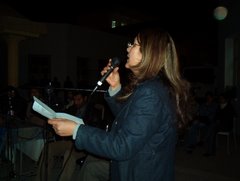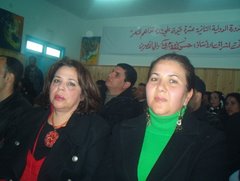ها قشة القلب التي
قد تبقّــتْ
أوقدِ الشوق بها
وانكسِــــــــرْ، وجعًا بي
كحبل غسـيـــــــلٍ
من الصيحة المرْتجاة
إلى آخر دمعة
يذرفها الأوفياء عليكَ
..............
ها قشّة القلب التي
قد تبقــّـتْ
أوصدِ الباب دونها
وانهمِــــــــــــــرْ
نم عند جثتك
للمســـاء
ذا الرّصيف
يعجّ بالجيف الجائعة
......
عساك تسوّلتَ بسمة للعشاء
دمعةً للرّيـاء
شمعة للصّباح الــّذي قطع التذكرة
..........
....................
ها قشة القلب التي قد تبقــّـت
وها جسد يقتفي أثرا
حاملا موته نطفة
..............
أوصدوا الباب واُمضوا
دعوني أؤسّـــس زغردة
للرّحيــــــــــل
دعوا جثّتي
تُتَرْجم عنّي
........
أيّتها الشمس لا تدخلي
تحت عُهدتي
ذي نافذة لا تُفتح للعابرين
شقيقة الريح،
لا تتقن فنّ الفرح
ترتدي الكفن برقعا،
تذرف الحزن في كلّ فصل.
أيّها الرّبيع
لماذا تسلـّلتَ إلينا
وقد أخطأتنا الطـّـــيـــوبُ؟
ما بالحناجر رجْعُ الصّدى
وما بموقد القلب جمْر
تسلـّلت ترشقنا بالفجيعة
كمومس تقف عند أبواب خلاّنها
....................
ها فؤادي مسجّى
وليمةَ دمع
ألمــًا يتناسل في الجثّة
..
تآمرْتَ دومًا علينا
كسيحا
تهشّ الجنائز
تُرجّع لحنَ الظهيرة
.................
أيّها المـُقْتاتون من وجَعي
تنحَّوْا قليلا
...
دعوني أرتــّب نعشي
لا تطنبوا في الرّياء
إنـّــني منتهٍ
عابر للسّبيل
لو أشاء أنشطــــر.
ربيع 2007




















هناك 5 تعليقات:
Est ce que c'est possible de corriger le probleme de la date qui s'affiche, je veux ajouter ton blog a http://tuniblogs.com mais ce probleme m'empeche de le faire.
ها قشة القلب التي
قد تبقــّــــــــــــت
و ها جسدي .....يقتفي أثري
نطفة ً للمــــــوت
و ذي جثّتـــي تترجم عنّي
1 - AL-FAT݈AH
In the name of god, the most gracious, The dispenser of grace: (1)
1 - According to most of the authorities, this invocation (which occurs at the beginning of every surah with the exception of surah 9) constitutes an integral part of "The Opening" and is, therefore, numbered as verse I. In all other instances, the invocation "in the name of God" precedes the surah as such, and is not counted among its verses. - Both the divine epithets rahman and rahrm are derived from the noun rahmah, which signifies "mercy", "compassion", "loving tenderness" and, more comprehensively, "grace". From the very earliest times, Islamic scholars have endeavoured to define the exact shades of meaning which differentiate the two terms. The best and simplest of these explanations is undoubtedly the one advanced by Ibn al-Qayyim (as quoted in Mandr I, 48): the term rahman circumscribes the quality of abounding grace inherent in, and inseparable from, the concept of God's Being, whereas rahrm expresses the manifestation of that grace in, and its effect upon, His creation-in other words, an aspect of His activity.
THIS SURAH is also called Fatihat al-Kitdb ("The Opening of the Divine Writ"), Umm al -Kitab ("The Essence of the Divine Writ"), Sarat al -Hamd ("The Surah of Praise"), Asds al-Qur'an ("The Foundation of the Qur'an"), and is known by several other names as well. It is mentioned elsewhere in the Qur'an as As-Sab` al-Mathdnr ("The Seven Oft-Repeated [Verses]") because it is repeated several times in the course of each of the five daily prayers. According to Bukharl, the designation Umm al-Kitab was given to it by the Prophet himself, and this in view of the f act that it contains, in a condensed form, all the fundamental principles laid down in the Qur'an: the principle of God's oneness and uniqueness, of His being the originator and fosterer of the universe, the fount of all life-giving grace, the One to whom man is ultimately responsible, the only power that can really guide and help; the call to righteous action in the life of this world ("guide us the straight way"); the principle of life after death and of the organic consequences of man's actions and behaviour (expressed in the term "Day of Judgment"); the principle of guidance through God's message-bearers (evident in the reference to "those upon whom God has bestowed His blessings") and, flowing from it, the principle of the continuity of all true religions (implied in the allusion to people who have lived - and erred - in the past); and, finally, the need for voluntary self-surrender to the will of the Supreme Being and, thus, for worshipping Him alone. It is for this reason that this surah has been formulated as a prayer, to be constantly repeated and reflected upon by the believer. "The Opening" was one of the earliest revelations bestowed upon the Prophet. Some authorities (for instance, `All ibn Abl Talib) were even of the opinion that it was the very first revelation; but this view is contradicted by authentic Traditions quoted by both Bukharl and Muslim, which unmistakably show that the first five verses of surah 96 ("The Germ-Cell") constituted the beginning of revelation. It is probable, however, that whereas the earlier revelations consisted of only a few verses each, "The Opening" was the first surah revealed to the Prophet in its entirety at bne time: and this would explain the view held by `All.
مرحباً أخت ليلى، لاحظت أنك تستخدمين في الموقع خلفية موسيقية من تأليفي وهو شيء رائع. ولكن أرجو أن تذكري ذلك في الموقع، يمكنك الاطلاع على كامل شروط استخدام الموسيقا في موقعي الموسيقي. تحياتي، جلال علي
http://www.jalalmusic.com
الله عليكي بجد
انا مبهورة بيكي وبكلماتك اللي في منتهى الروعة
انا عرفت مدونتك دي بالصدفة وعجبتني جدا
تحياتي ليكي ولقلمك الرائع
إرسال تعليق